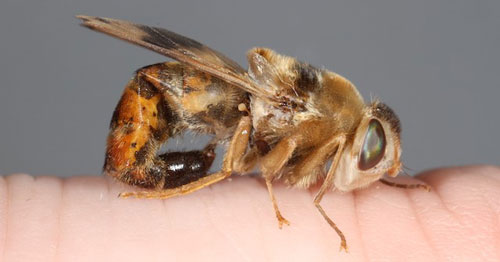Saundra TenBroeck, UF/IFAS State Extension Horse Specialist
Days are getting shorter, and nights are getting colder. Though the mosquito burden is subsiding, there are still fly pests of horses that seem to fair very well in the cooler months of the year in Florida.
–
Horse Bot Fly
Bot Flies Gasterophilus intestinalis and Gasterophilus nasalis are the more common species found in Florida. Only one generation is produced per year, with egg laying activity more often seen in the late summer and early fall in North Florida. Though the adult has no mouth parts and does not feed, egg laying activity causes mild to extreme behavioral responses from the horse. The migrating and developing larvae can cause mouth pain, as well as damage to the stomach and small intestines, and potentially colic and other more serious symptoms. Mature larvae are passed out in the feces during the summer and burrow into the soil where they pupate. After 1-2 months the adult emerges.
Control – The best method of control is to break the life cycle. Removing the eggs from the horse’s hair or wiping with a warm cloth is a mechanical way to help prevent the larvae from ever entering the horse. Handlers should wear gloves when doing this because the larvae can easily penetrate human skin and potentially migrate. Strategic deworming with any of the avermectin/moxidectin products in the fall about a month after the first sighting of eggs should kill 2nd and 3rd stage larvae.
–
Stable Flies
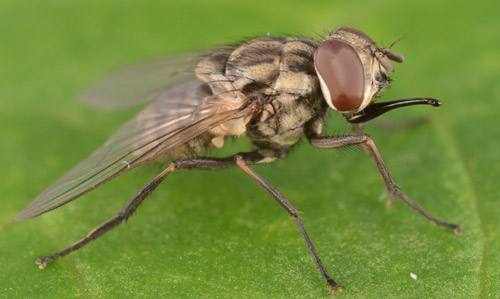
Stable Flies (Stomoxys calcitrans) Note the mouthparts projecting forward. Credit: Lyle Buss, UF/IFAS
Stable Flies Stomoxys calcitrans thrive in cooler, wet months when hay residue is available as a breeding medium. These flies are persistent blood feeders delivering a painful bite. Both male and females take blood meals during the day and the preferred feeding site is the lower legs. If you see a lot of foot stomping, it is likely that your major problem is stable flies. Cleaning up hay residue, composting manure and dragging pastures are the best methods of control.
–
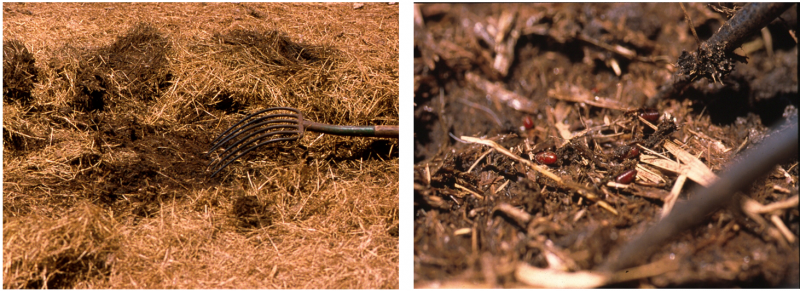
Stable fly pupal cases can be found under hay residue. Thousands of larvae may be living under bedding. Credit: Jerome Hogsette, USDA
–
Horn Flies
Horn Flies Haematobia iritans irritans are cattle pests that cause significant production losses. Horn flies remain on the host animal at all times, only leaving to lay eggs in fresh cow patties. Although horses are a dead-end host, if your horses are near cattle pastures, you will likely see horn flies on their backs and bellies. They do take blood meals and are certainly a nuisance, but they are of minimal economic consequence to horses. Fly spray is effective in removing them.
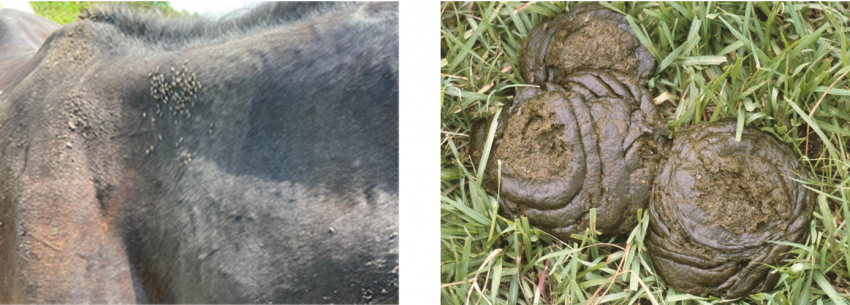
Left-Horn flies on horses pastured near cattle are common. Credit: Cassandra Olds, Kansas State University. Right-Horn flies only lay eggs in fresh cow patties. Credit: Jerome Hogsette, USDA
–
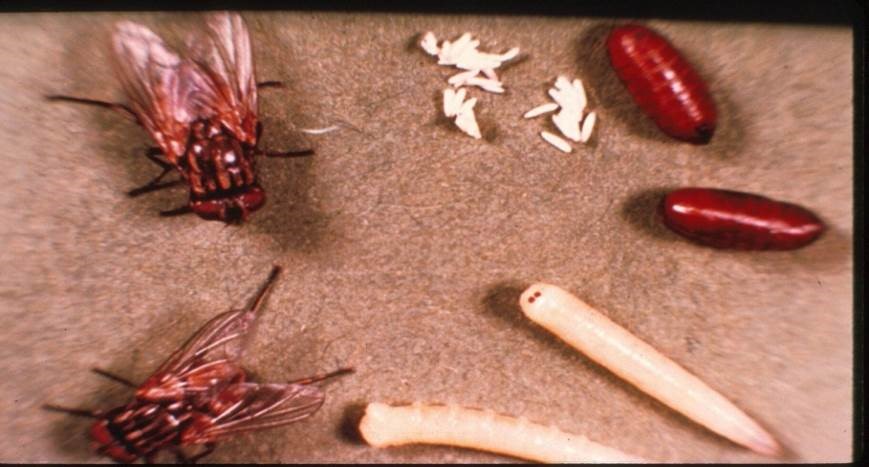
The life cycle from egg to adult in ideal conditions for stable flies is 10 -14 days, and for horn flies is 21 days.
Credit: Jerry Butler, UF/IFAS
–
Integrated Pest Management
Fly control is best accomplished by using several management strategies. Flies need breeding materials, optimum moisture, and adequate warmth to complete their life cycles. Integrated pest management strategies focusing on pest prevention, pest reduction, and elimination of conditions that lead to pest infestations are the science-based, common-sense way to control pests. Elimination of breeding materials, control of moisture, mechanical control, and judicious use of insecticides in combination is the best approach. Good sanitation and composting are relatively inexpensive, environmentally friendly approaches to fly control. They will also get you high marks with your neighbors.

Left-Dispersing stall waste into open piles only encourages fly breeding. Right-Creating a compost pile with stall waste and covering to control moisture is a great way to turn manure into an organic fertilizer. Credit: Jerome Hogsette, USDA
–
Several relevant University of Florida publications can be found at: horse pests.
Horse Bot Fly
Horse Bots
Stable Fly
- Dr. Saundra TenBroeck is Looking Forward to Looking Back after 40 Years of Service - October 10, 2025
- End of Life Issues – Euthanasia:A Horse Owner’s Final Act of Care - October 4, 2024
- Economic Impact Study Indicates the Florida Equine Industry Remains Strong - April 12, 2024

